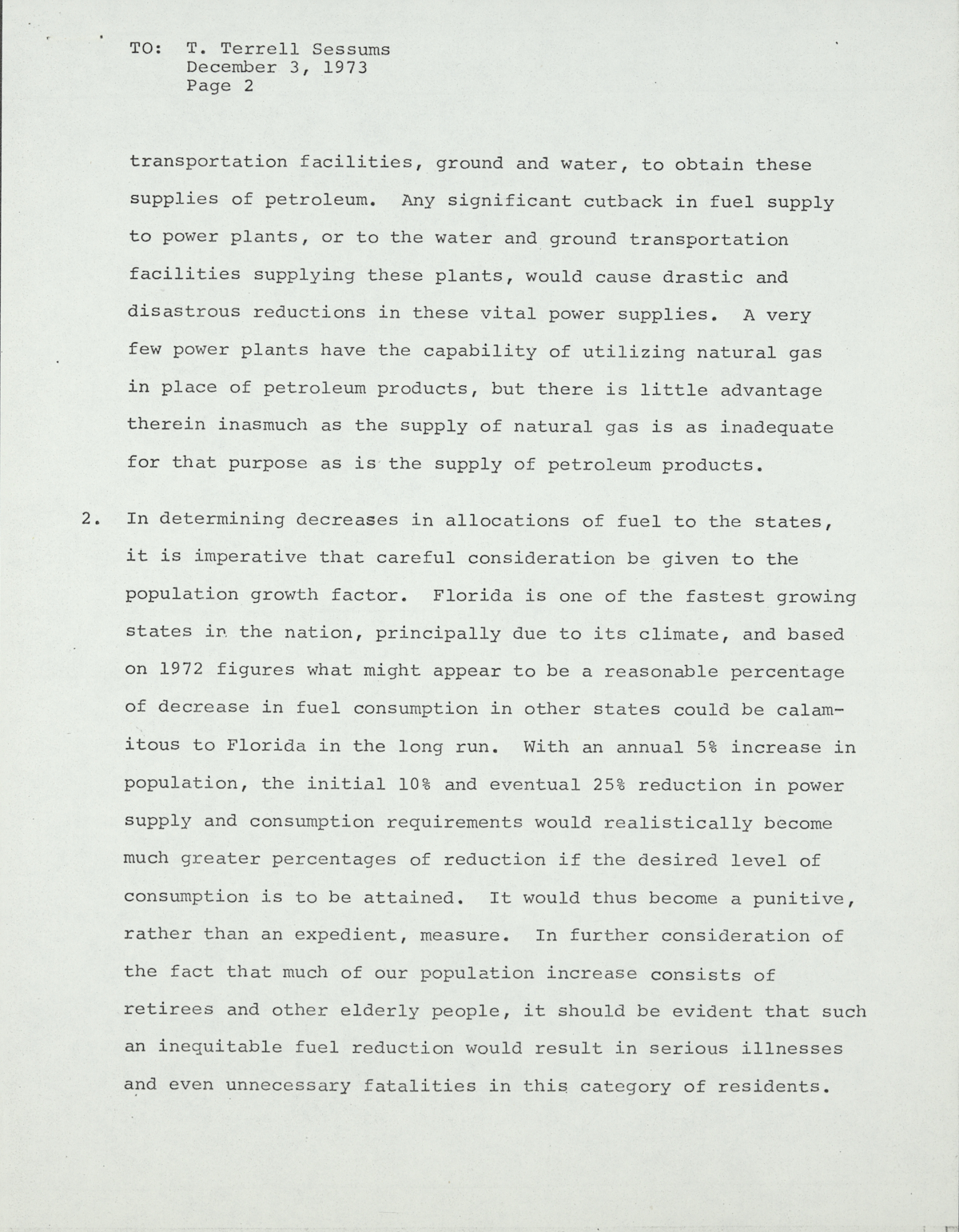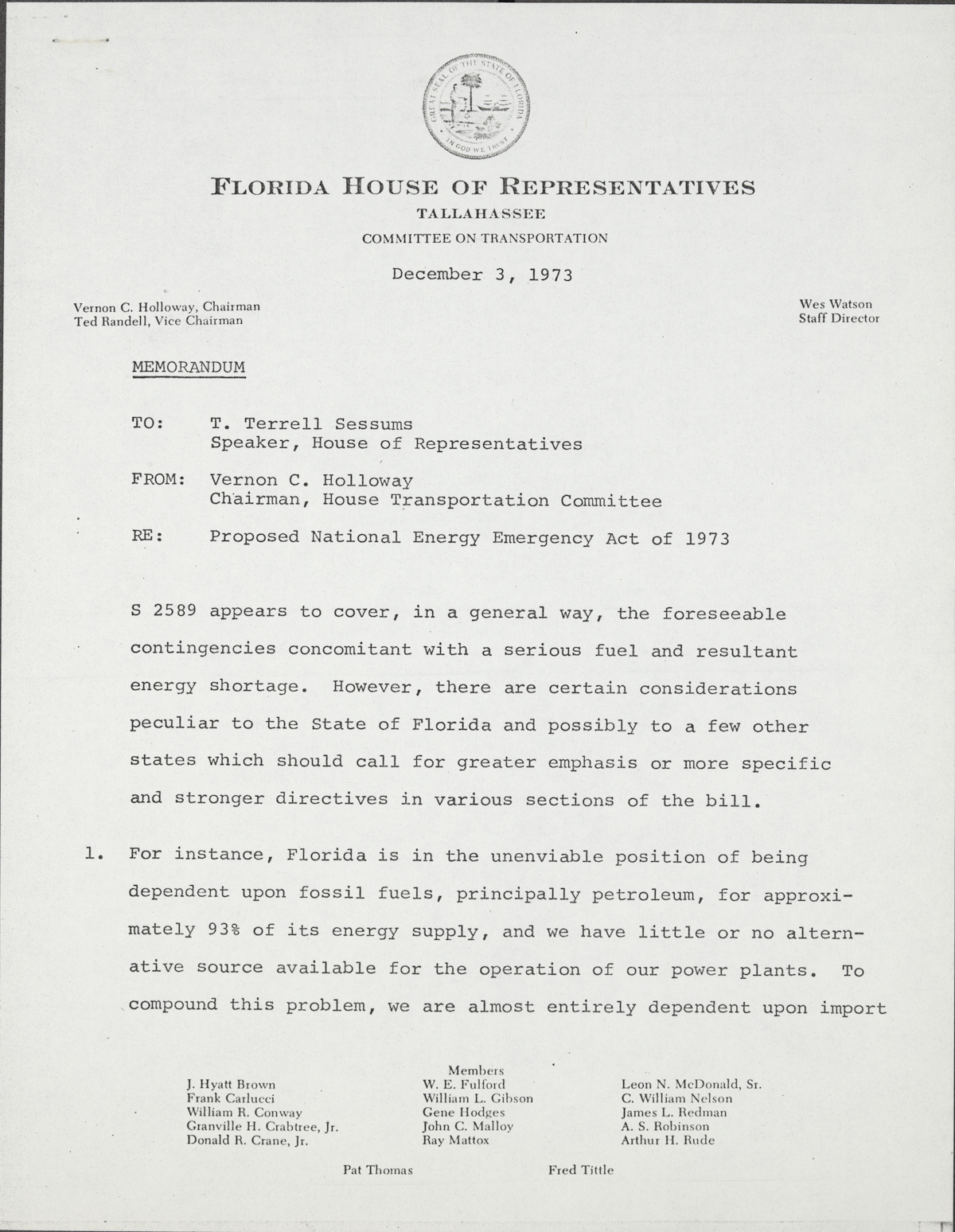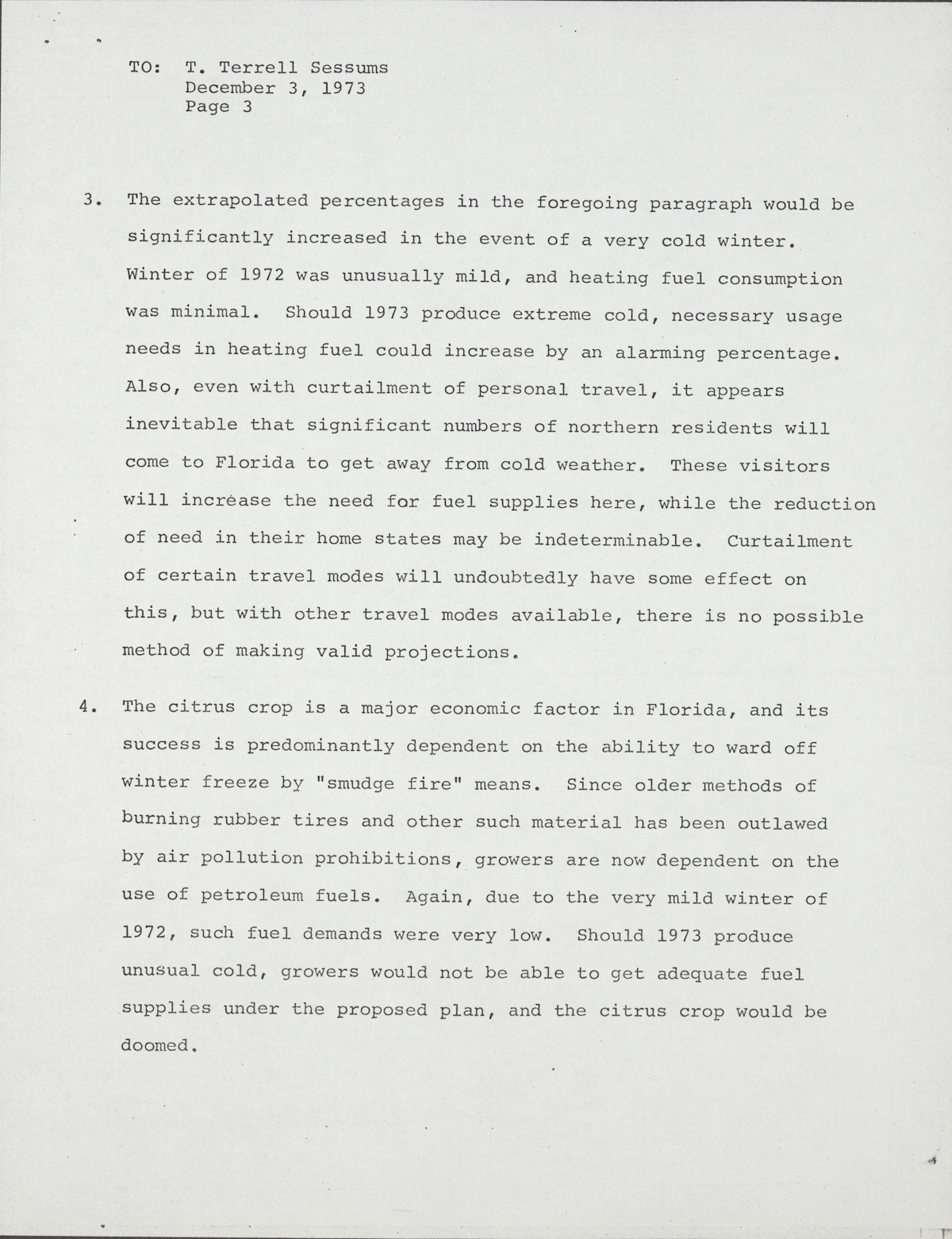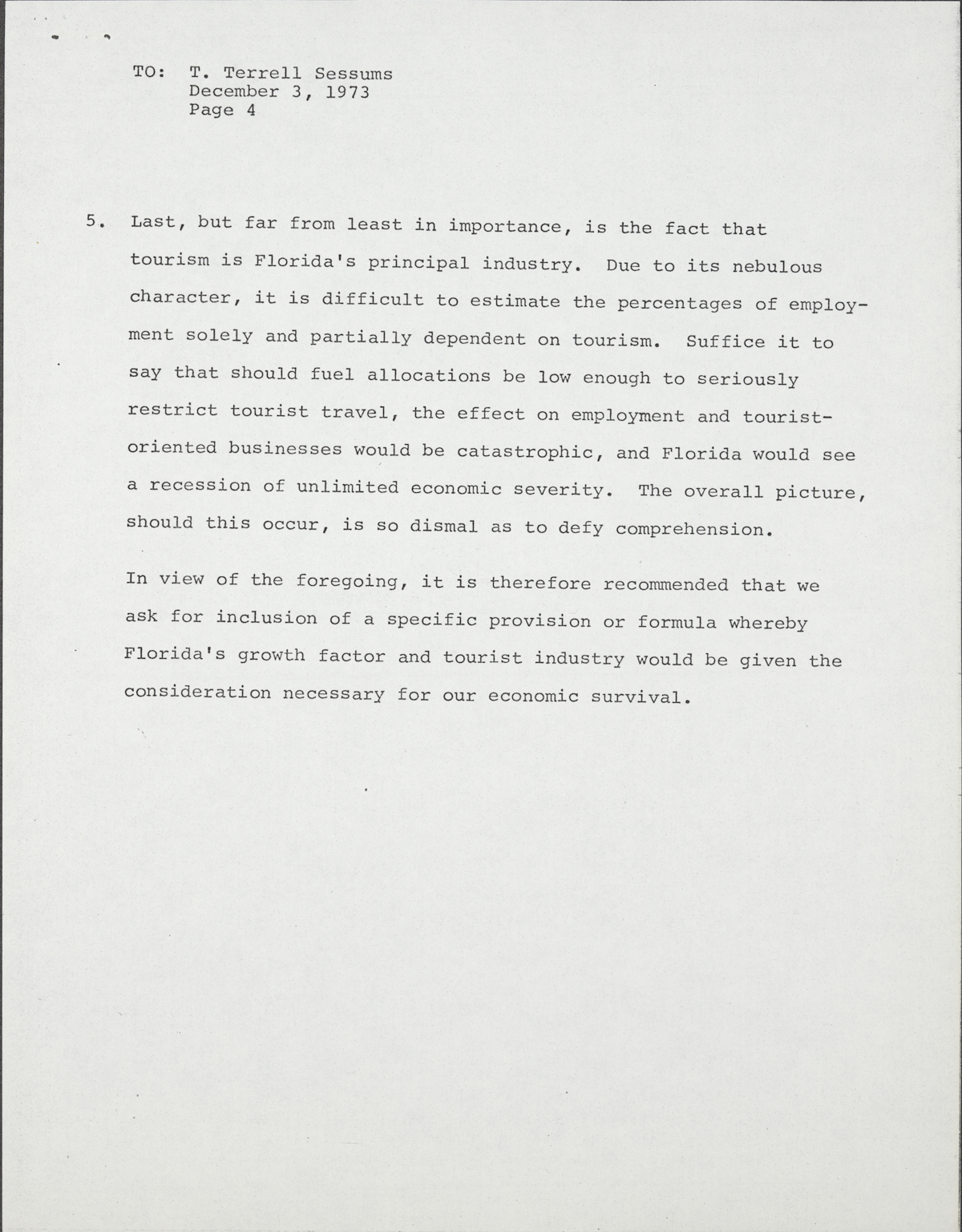Florida Memory is administered by the Florida Department of State, Division of Library and Information Services, Bureau of Archives and Records Management. The digitized records on Florida Memory come from the collections of the State Archives of Florida and the special collections of the State Library of Florida.

State Archives of Florida
- ArchivesFlorida.com
- State Archives Online Catalog
- ArchivesFlorida.com
- ArchivesFlorida.com
State Library of Florida
Related Sites

Description of previous item
Description of next item

Memorandum from Vernon Caryle Holloway, Chairman of the Florida House Committee on Transportation, to T. Terrell Sessums, Speaker of the Florida House of Representatives, about the National Energy Emergency Act of 1973, December 3, 1973
Source
Description
Date
Format
Topic
Subjects
Geographic Term
General Note
In 1973, members of the Organization of Arab Petroleum Exporting Countries (OAPEC) placed an oil embargo on the United States in response to President Nixon’s support of Israel during the Yom Kippur War.
With energy shortages and skyrocketing prices, the United States had to create strategies for conserving fuel. President Nixon even created a new agency called the Federal Energy Office, later the Federal Energy Administration. Other tactics included reducing highway speed limits to 55 miles per hour, and putting the country on year-round Daylight Saving Time.
Although the oil embargo was lifted in March of 1974, the impacts of the crisis were felt throughout the rest of the decade. The United States was in an economic recession until 1975, and the country experienced a second energy crisis in 1979 in the aftermath of the Iranian Revolution.
2. In determining decreases in allocations of fuel to the states, it is imperative that careful consideration be given to the population growth factor. Florida is one of the Fastest growing States in the nation, principally due to its climate, and based on 1972 figures what might appear to be a reasonable percentage of decrease in fuel consumption in other states could be calamitous to Florida in the long run. With an annual 5% increase in population, the initial 10% and eventual 25% reduction in power Supply and consumption requirements would realistically become much greater percentages of reduction if the desired level of consumption is to be attained. It would thus become a punitive, rather than an expedient, measure. In further consideration of the fact that much of our population increase consists of retirees and other elderly people, it should be evident that such an inequitable fuel reduction would result in serious illnesses and even unnecessary fatalities in this category of residents.
Title
Subject
Description
Creator
Source
Date
Contributor
Format
Language
Type
Identifier
Coverage
Geographic Term
Thumbnail
ImageID
topic
Subject - Corporate
Subject - Person
Transcript
TALLAHASSEE
COMMITTEE ON TRANSPORTATION
December 3, 1973
Vernon C. Holloway, Chairman
Ted Randell, Vice Chairman
Wes Watson
Staff Director
MEMORANDUM
TO: T. Terrell Sessums
Speaker, House of Representatives
FROM: Vernon C. Holloway
Chairman, House Transportation Committee
RE: Proposed National Energy Emergency Act of 1973
S 2589 appears to cover, in a general way, the foreseeable contingencies concomitant with a serious fuel and resultant energy Shortage. However, there are certain considerations peculiar to the State of Florida and possibly to a few other States which should call for greater emphasis or more specific and stronger directives in various sections of the bill.
1. For instance, Florida is in the unenviable position of being dependent upon fossil fuels, principally petroleum, for approximately 93% of its energy supply, and we have little or no alternative source available for the operation of our power plants. To compound this problem, we are almost entirely dependent upon import
[Footer with Member names]
Members
J. Hyatt Brown
Frank Carlucci
William R. Conway
Granville H. Crabtree, Jr.
Donald R. Crane, Jr.
W. E. Fulford
William L. Gibson
Gene Hodges
John C. Malloy
Ray Mattox
Leon N. McDonald, Sr.
C. William Nelson
James L. Redman
A. S. Robinson
Arthur H. Rude
Pat Thomas
Fred Tittle
2. In determining decreases in allocations of fuel to the states, it is imperative that careful consideration be given to the population growth factor. Florida is one of the Fastest growing States in the nation, principally due to its climate, and based on 1972 figures what might appear to be a reasonable percentage of decrease in fuel consumption in other states could be calamitous to Florida in the long run. With an annual 5% increase in population, the initial 10% and eventual 25% reduction in power Supply and consumption requirements would realistically become much greater percentages of reduction if the desired level of consumption is to be attained. It would thus become a punitive, rather than an expedient, measure. In further consideration of the fact that much of our population increase consists of retirees and other elderly people, it should be evident that such an inequitable fuel reduction would result in serious illnesses and even unnecessary fatalities in this category of residents.
4. The citrus crop is a major economic factor in Florida, and its success is predominantly dependent on the ability to ward off winter freeze by “smudge fire" means. Since older methods of burning rubber tires and other such material has been outlawed by air pollution prohibitions, growers are now dependent on the use of petroleum fuels. Again, due to the very mild winter of 1972, such fuel demands were very low. Should 1973 produce unusual cold, growers would not be able to get adequate fuel supplies under the proposed plan, and the citrus crop would be doomed.
In view of the foregoing, it is therefore recommended that we ask for inclusion of a specific provision or formula whereby Florida's growth factor and tourist industry would be given the consideration necessary for our economic survival.
General Note
In 1973, members of the Organization of Arab Petroleum Exporting Countries (OAPEC) placed an oil embargo on the United States in response to President Nixon’s support of Israel during the Yom Kippur War.
With energy shortages and skyrocketing prices, the United States had to create strategies for conserving fuel. President Nixon even created a new agency called the Federal Energy Office, later the Federal Energy Administration. Other tactics included reducing highway speed limits to 55 miles per hour, and putting the country on year-round Daylight Saving Time.
Although the oil embargo was lifted in March of 1974, the impacts of the crisis were felt throughout the rest of the decade. The United States was in an economic recession until 1975, and the country experienced a second energy crisis in 1979 in the aftermath of the Iranian Revolution.
Chicago Manual of Style
Holloway, Vernon Caryle, 1919-2000. Memorandum from Vernon Caryle Holloway, Chairman of the Florida House Committee on Transportation, to T. Terrell Sessums, Speaker of the Florida House of Representatives, about the National Energy Emergency Act of 1973, December 3, 1973. 1973-12-03. State Archives of Florida, Florida Memory. <https://www.floridamemory.com/items/show/350904>, accessed 25 January 2026.
MLA
Holloway, Vernon Caryle, 1919-2000. Memorandum from Vernon Caryle Holloway, Chairman of the Florida House Committee on Transportation, to T. Terrell Sessums, Speaker of the Florida House of Representatives, about the National Energy Emergency Act of 1973, December 3, 1973. 1973-12-03. State Archives of Florida, Florida Memory. Accessed 25 Jan. 2026.<https://www.floridamemory.com/items/show/350904>
AP Style Photo Citation
(State Archives of Florida/Holloway)

 Listen: The Assorted Selections Program
Listen: The Assorted Selections Program

